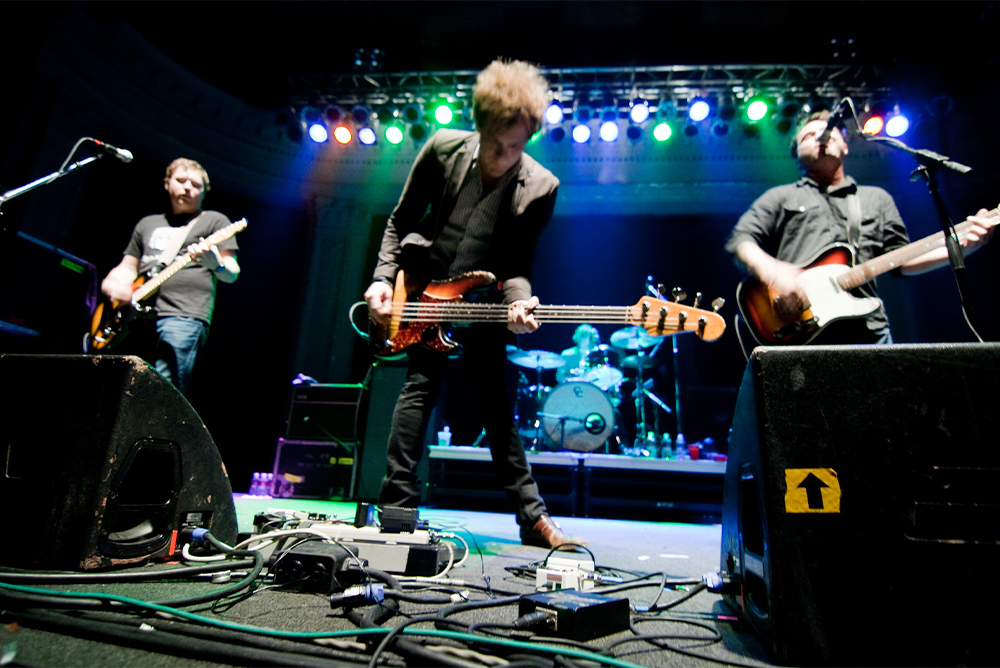
Poet Derek Mong reflects on a youth listening to emo music, the lessons he learned, and the wisdom he’s now passing down to his own teenage son. Pictured: The Get Up Kids perform at the Newport Music Hall in Columbus, Ohio in 2009. Courtesy of Allan Foster/Flickr (CC BY-NC-ND 2.0).
Is it normal to wonder how you didn’t wind up more of a mess?
As a man, I sometimes find myself asking this question. As an American, I’ve met my fair share of masculinist jerks. Like the father berating his “loser” son—the kid had just lost a wrestling match—in a public restroom. Like the dudes who heckled me for walking my dog while wearing pink shorts. These are the men that make men look bad, though sometimes I worry that they’re just most men, full stop.
How then did I come to be spared (I hope) from masculinity’s more toxic trends? My feminist parents deserve some credit. Ditto my propensity, born of book-worming, for imagining myself as other people. My physique, lanky as a praying mantis, kept me out of the nastier sports.
To these I’ll add emo music, the soundtrack to my teen years, when I tried on new selves like so many pairs of socks.
What, you may ask, is emo? “Emo” is short for emotional, though my friends captured the genre in four words: “whiney white boy music.” Think Death Cab for Cutie. Google or Wiki will mash up adjectives in search of a definition: confessionalist, sensitive, hardcore, punk. Subgenres and regional schools proliferate, but to my amateur ears, emo means one thing: lovelorn dislocation from girls, popularity, and joy. Lyrics swoon, guitars moan, and band names broadcast—in the thickest of ironies—absence or loss.
Take these telling examples, provided here with a gloss: The Promise Ring (no doubt broken), American Football (our kind didn’t play), The Anniversary (preceding a break-up), and The Get Up Kids (no thanks, we’ll sit this one out). These were my mixtape heroes and masculine lodestars in the 1990s skinny jean scene of Cleveland, Ohio.
What did they teach me about masculinity? About life? That my hopes would be dashed, I’m guaranteed nothing, and girls will probably find someone else. This might sound like a common enough lesson, but it matters more when you grow up—as I did—white, hetero, suburban, and male. American culture raises our kind to Everest-like heights of entitlement. About sex, success, or art. Emo music bred some of that out of me.
As a virgin with a Walkman, I didn’t loathe girls I wasn’t dating; I moped. At concerts with my fellow mop tops. Finding melody to answer the “misery” of my day.
Of course, I wasn’t miserable, not really, but I’d found a community to help when I convinced myself that I was. Emo music offered me the first taste of a collective subculture, a “we” built not of chest-thumping aggression but of angst-laden melodrama. We swapped physical strength for hyperbolic introspection. We sang together in the little basement of our misspent desires. When the Get Up Kids crooned that “I’ll cry until I can’t see the whites of your eyes,” I knew, then and there, that boys could cry, and it could be cool.
Dorm poster cool. Chuck Taylors cool. Studded belt cool. I remade myself in the emo star’s moody likeness. Was a trip to Hot Topic involved? I’m afraid it was. Did I style my haircut—swoop of bangs to curtain one eye—after Bright Eyes’ frontman Conor Oberst? There are 35mm prints to prove that I did. He and emo’s other singer-songwriters seemed to hop, fully formed, from tour vans. They wrote lyrics that circled back—like black hair dye in a hotel sink—to their own vulnerability.

Photograph of the author as a young man leaning into emo’s “angst-laden melodrama.” (Image courtesy of Kerry Farrell)
In retrospect, vulnerability was emo’s greatest gift—at least for this male devotee. Vulnerability is anathema to traditional masculinity. Vulnerability, exposed or expressed, will get you mocked, maligned, or beat up. But emo’s lead singers wrapped vulnerability in Western shirts and suede jackets. Vulnerability shined from the band logoed-buttons we wore like merit badges down the straps of our shoulder bags—men could wear shoulder bags!
There was, I now see, a backward logic to this little salvation. I drew strength from emo’s overt vulnerability. I eschewed male violence while hugging the mosh pit’s softer circumference. (I never quite jumped in.) I met girls while listening to songs about not meeting girls. I still remember one who, mid-song at a Built to Spill concert, looked me in the eyes and tousled my hair. Was she high? Was she flirting? I spent the whole set trying to find her again in the crowd. (I failed.)
Was emo a panacea to toxic masculinity? Surely not. Was it feminist? I wish. The critic Jessica Hopper writes movingly of the women in emo songs; they’re just “vessels redeemed in the light of boy love.” Emo’s vulnerability, she notes, admits no “empathy, no peerage or parallelism” for girls. I don’t dispute it, but in the slow and ongoing project of my male self-improvement, emo offered a way out. From social isolation and depression. From a physical fight.
Thanks to emo, I took up cross country, inspired in part by Four Minute Mile (1997), an early Get Up Kids album that featured, on its cover, a track star in knee-highs having a smoke. I discovered another band called Track Star. These songs kept me running. And running kept me confident. That I could just flip the bird to my bullies. That I could flee.
In time, emo offered a bridge to richer, more nuanced art. In college I discovered poetry, my life’s work. Is it any wonder that an emo kid fell for poetry? As McSweeney’s notes, Emily Dickinson can sound awfully emo—“I’m Nobody! Who are you? / Are you – Nobody – too?” Rainer Maria, a female-led emo trio that met in a poetry workshop, took their name from Rainer Maria Rilke. My own collegiate poetry workshops taught me how much I needed to mature. And stat.
I’ll offer one example of this, and one alone, which I’ve quoted to students whose bleeding hearts leave stains on my floor. The year was 2001. I’d submitted my first poem—a love elegy, no doubt—to my professor David Baker. “What is this, Derek? Over dramatized teenage angst?” David asked. “It reads like Shelley on a surfboard.” I’ve known David, a marvelous poet, long enough to thank him for this intervention. Long enough to realize that “Shelley on a surfboard” is a solid definition of emo. David helped me see, to quote Rilke, that I “must change my life.”
“Men at forty learn / Learn to close softly / The doors to rooms they will not be / Coming back to,” writes the poet Donald Justice. True enough, I’ve found, but less so in an era when old infatuations are just one click away. It’s easy to revisit my emo adolescence, which I’ve done a lot since my son tip-toed into middle school’s hall of mirrors. In the quiet hours before dinner, with my finger above the play button, I wonder: should I give him a tour of my youth?
The answer to this question is obvious to any parent: please, don’t. So too are the reasons why: because he’ll spit back much of the culture you offer; because he needs to discover his music and his masculinity, not yours. Thankfully, his life offers countless opportunities to do so, and his parents aren’t yet so “sus” as to be fully ignored (sus [adj., chiefly teenage]: suspicious, old).
Take one recent decision with lasting social repercussions: what instrument would he wield in band? Our son chose the flute. He YouTubed a few lessons. His excitement lifted like a cool and resonant note. Then he came home with a hesitation: Only one other boy played flute.
We chatted as a family about gender and music. We asked him why some instruments seemed “manly” or “girly”; where do those flimsy presumptions begin? And aren’t those categories increasingly fluid, challenged daily by his non-binary friend? Mostly, though, my wife and I did what most parents do in a crisis: we turned to the internet for help.
There we learned that James Madison, an actual Founding Father, once owned a crystal flute. Can you get more manly than Madison? We learned that Lizzo played the flute too—had in fact played Madison’s flute while twerking. Lizzo’s coolness, my son intuited, needed no proof. Then we watched the now famous video. Then we watched it again.
Was this enough to convince him? What had we hoped to achieve? We know that, months later, he’s still playing. We know too that he now likes to perform. His audience: our good friends and their daughter, who captured the performance on her phone. His repertoire: the “Among Us” theme song, which—bless his heart—he’d memorized that week.
Whatever emo did for me, dear Reader, is nothing compared to this, one of masculinity’s more hopeful futures: a 12-year-old boy, woodwind in hand, shaking everything he’s got.




Send A Letter To the Editors